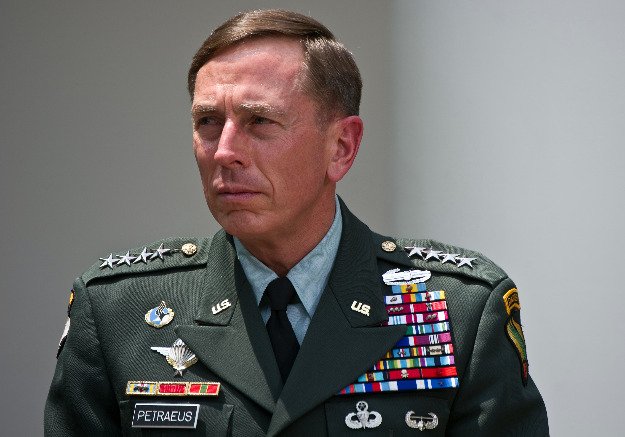Friday’s resignation of CIA Director David Petraeus after admitting to an affair was a shock to the national security establishment in D.C. General Petraeus has enjoyed a reputation of untouchable integrity and vast achievement, and his sudden fall from grace took many by surprise.
Before his resignation, a retinue of officials and subordinate officers zealously guarded Petreaus’ reputation, promoted him in the media and ran careful interference for him within the national security bureaucracies. Indeed one of those subordinates was his mistress, Paula Broadwell, a PhD student who in turn wrote an effusive, embarrassing biography of Petraeus that read more like a high school love letter to the quarterback than official profile.
Paula Broadwell and I clashed a few years ago when, in the course of shadowing Petraeus for her biography (which is also the topic of her dissertation, and on whose dissertation committee Petraeus sits), she wrote glowingly of a decision, to demolish several Afghan villages in Kandahar province, approved by Petraeus himself. It was a dehumanizing, disgusting effort, one she bragged came straight from the General himself.
Few ever really asked many questions about those villages. They were little more than a blip on the radar of the great Petraeus narrative that painted a fragile-but-reversible momentum in Afghanistan (optimism that now seems quaint). But the incident always stuck out for me: the idea of destroying villages to save them was a throwback to a particularly ugly era of U.S. warfighting, one Petraeus himself had dissected and critiqued for his own PhD at Princeton. That I caught Broadwell lying about it in her book, years later, is almost beside the point: a shocking, horrific incident was just fodder for the Petraeus As Conquering General media narrative that took hold in Washington.
This narrative has its roots back in Iraq, in 2005, when Petraeus was running the training program for the Iraqi military. General Petreaus made the cover of Newsweek three times – more than the commander of all forces in Iraq. But in the course of this relatively minor task, he managed to flood the country with weapons he never accounted for. Incidentally, the training mission never really worked. It had to be revamped, and still took the Iraqi civil war to settle tensions enough for policymakers to envision turning the whole thing over to the Iraqis.
After the Iraq civil war in 2006, Petraeus took credit for operating the troop Surge. This was during the Awakening movement, where local Iraqi villagers grew tired of the predations of al Qaeda militants and took arms against them. While Petraeus certainly deserves credit for recognizing this uprising and successfully exploiting it, the ebullient praise that he “won” the war in Iraq lavished on him is just not true – especially when we consider the (shockingly violent) Iraq of today.
The real tragedy of David Petraeus resignation is that he didn’t retire over these and other failures. The salacious details of how he was discovered – Broadwell turns out to be a jealous type, and her target somehow got the FBI to investigate the lovers’ quarrel – should not matter unless there was criminal wrongdoing or if Petraeus broke an oath that would make him vulnerable (such as not disclosing his affair).
Rather, General Petraeus had a reputation his record simply could not support. It would be difficult to say Iraq was noticeably improved by his presence – certainly before 2006, but also during the Surge (which produced only a temporary cessation in the incredible violence). At CENTCOM (United States Central Command, where he was Director from 2008-2010), he oversaw the expansion of the war in Afghanistan, which has been a humiliating disaster. Additionally, his protégé, Stanley McChrystal, made a mockery of civil-military relations and was summarily fired. As ISAF (International Security Assistance Force) commander, Petraeus oversaw a dramatic rise in violence in Afghanistan, the adoption of “night raids” and a complete breakdown of relations between Kabul and Washington. And at the CIA, he has pushed the final transformation of an agency known more for its human element into a paramilitary engine of assassination – leaving a huge gaping hole where the country’s human intelligence capabilities used to be.
This is not a man who should be drummed out of office for having an affair. He should have been drummed out of office for not living up to his own legend. David Petraeus is a paper tiger: his personality cult looks impressive until you get close enough, and then the whole façade crumbles away.
Lost in the Petraeus affair is a very simple question: do we want a man who judged his subordinates’ intellectual capacity by how well they can hold a six-minute mile on his morning run to lead our premier intelligence agency? It was Petraeus’ lack of intellectual integrity and incredible narcissism that should prompt us to reevaluate his legacy, not who he chose to sleep with.
Joshua Foust is a fellow at the American Security Project and the author of Afghanistan Journal: Selections from Registan.net. He is a member of the Atlantic Council’s Young Atlanticist Working Group, and used to work as a civilian cultural advisor for the US Army. This article originally appeared in PBS Need to Know.
Image: petraeus-afghanistan.jpg
